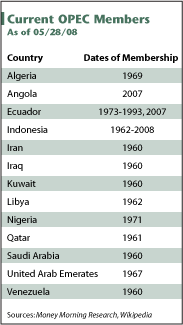By Jennifer Yousfi
Managing Editor
Indonesia, the sole Asian member of the Organization of the Petroleum Exporting Countries (OPEC), will withdraw from the oil cartel at the end of this year.
Energy Minister Purnomo Yusgiantoro announced yesterday (Wednesday) that he would sign a decree officially withdrawing Indonesia from OPEC when its membership expires at the end of 2008.
A member since 1962, Indonesia's exports have been waning for years due to aging oil wells and a lack of infrastructure investment by the government. Oil production is down 49% from its 1977 peak. The country has now become a net importer of oil, Purnomo said.
"If production comes back to give us the status of net oil exporter then we can go back to OPEC," Purnomo said, speaking before the Jakarta Foreign Correspondents Club yesterday, Bloomberg News reported.
Indonesia's withdrawal from OPEC will help the Asian nation save an estimated $3.1 million (2 million euros) in membership fees per year, Purnomo noted.
|
The country has more than 4 billion barrel in proven reserves, according to the AFP. However, Indonesia's production has been dropping steadily since 1995. So while other OPEC member nations have been benefiting from high oil prices, Indonesia has suffered as it has been forced to import oil. "If OPEC had more solidarity with its members and helped those like us who are suffering from the current high prices, it would have been a different matter," Indonesia's Parliament energy committee chairman Agusman Effendi told the AFP. Indonesia's daily oil output has fallen to 927,000 barrels per day (bpd) this year, down from 950,000 barrels a day in 2007. Its daily output falls short of the nation's daily consumption of approximately 1.2 to 1.3 million barrels per day, according to Reuters UK. |
 |
The Indonesian government heavily subsidizes retail oil sales to the tune of almost $13 million per year. But due to rising costs, the government has had to enact unpopular fuel price increases, which have sparked civilian protests.
Oil's Bubbling Higher
Oil reached a record high of $135 per barrel on May 22, but since then the price has dropped.
Oil prices continued to be volatile yesterday. At 1:48 p.m., oil for July delivery was trading at $131.28 a barrel on the New York Mercantile Exchange. Earlier, however, crude oil traded down as low as $125.96 yesterday, according to Bloomberg data.
But the slight reprieve we're currently experiencing is likely to reverse itself just as quickly as we head into the summer driving season and speculators continue to drive up the price of "black gold."
Both Goldman Sachs Group Inc. (GS) and JP Morgan Chase & Co. (JPM) recently released reports that have oil soaring over $200 a barrel within the next two years.
Money Morning Investment Director Keith Fitz-Gerald - one of the first investment gurus to predict triple-digit oil prices - has boosted his own target, suggesting that oil could go as high as $225 a barrel.
"The math is really simple here," Fitz-Gerald said in a recent e-mail interview from China. "We are burning through supplies at a rate that's four times to five times faster than we're discovering new reserves. Throw in a few [surprises]... perhaps a terrorist event... and add in the accelerating use of oil and gasoline in Third World countries, and we have the recipe for far higher prices."
News and Related Story Links:
- Bloomberg News:
Indonesia to Pull Out of OPEC as Oil Output Drops
- Reuters UK:
Indonesia to quit OPEC over costly oil
- Wikipedia:
OPEC
- Money Morning:
Money Morning Boosts Oil Target Price to $225 a Barrel, Thanks to Continued Scarcity, Burgeoning Demand in China
- Money Morning Investment Series:
Cashing in on Commodities: What's Driving the Oil Bull, How Much Further It Will Go, and How Investors Can Profit


